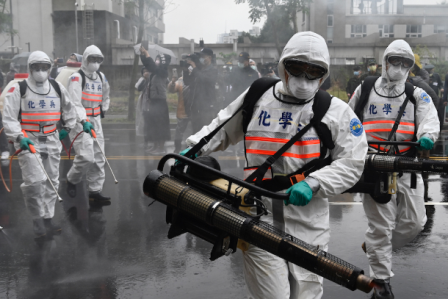Have you seen how Taiwan managed Covid-19?
March 31, 2020 · By Richard Fang, Hong Kong for www.ucanews.com

Soldiers from the Taiwanese military’s chemical units take part in a drill organised by the New Taipei City government to prevent the spread of the coronavirus in Xindian district on March 14. (Photo: Sam Yeh/AFP)
Taiwan and Italy reported their first Covid-19 cases 10 days apart. But they wrote two different stories for the world to learn from.
With close economic and cultural ties to China, Taiwan has recorded just 215 cases and two deaths. Across the world in Europe, Italy has reported 69,176 cases and 6,820 deaths, with a world-leading fatality rate of more than 9 percent.
The Italian scenario is the most devastating in the entire world. Last week its death toll overtook China, where the virus first appeared in Wuhan in late December. China has officially reported only 3,281 deaths.
The pattern of an exponential explosion in the number of Covid-19 cases, after weeks of government inaction, has been repeated across Western countries such as Spain, France, Germany, the UK and the US.
Although not a member of the World Health Organization (WHO) due to pressure from Beijing, Taiwan has successfully contained the contagion despite its proximity to China, the epicenter of the outbreak.
About 400,000 of Taiwan’s 23 million citizens live and work in mainland China. At the narrowest point, the Taiwan Strait between the island and mainland China is just 130 kilometers. It made Taiwan an ideal candidate for contracting the new coronavirus from China. But it did not happen.
Efficient screening
In early February, Taiwan put in place border restrictions and an efficient screening and tracing system. Beginning Feb. 6, Taiwan banned the entry of anyone who had been in China or Hong Kong during the previous 14 days.
The Taiwan government made sure those under self-quarantine followed medical directions by monitoring them via GPS on phones and messaging systems, with police keeping a close tab on those who left their apartments.
It also quarantined foreign nationals. At the start of this month, the New Taipei City government imposed a maximum fine on a man who arrived from mainland China, refused to quarantine, boarded a high-speed train and then tried to catch a plane off the island.
Police officers caught up with him at a nightclub in Taipei and asked him to cough up a US$33,000 fine. By March 19, the travel ban was extended to all foreigners without Taiwanese residence certification.
Blessing in disguise
Taiwan, under its new President Tsai Ing-wen, activated its Central Epidemic Command Center (CECC) in the second week of January, with the minister of health as its commander, and set aside US$2 billion to deal with the crisis.
In the following weeks, the CECC introduced scores of measures to prevent the epidemic from spreading. These included the screening of incoming travelers for fever and implementing a system of rationing face masks to avoid hoarding while neighboring countries were reporting panic buying of masks.
After President Tsai’s landslide re-election in January, China refused to airlift more than 500 Taiwanese people stuck in the central province of Hubei, where the fatal virus first surfaced in late December.
Beijing’s intransigence was attributed to its arrogance that it did not want a “renegade Taiwan” to act as an independent nation by airlifting its people at the time of a crisis. The stubbornness of China was a blessing in disguise for Taiwan as less affected people reached its shores from Wuhan. However, they were airlifted in early March.
Taiwan’s preparedness comes from the lessons learned during the severe acute respiratory syndrome (SARS) epidemic which claimed 71 deaths in the country in 2003. During the initial days of SARS, the lack of a centralized decision-making body hampered efforts. It forced Taiwan to set up the CECC later that year to coordinate action across government departments.
Taiwan’s Vice President Chen Chien-Jen, a trained epidemiologist, helped the system to coordinate better after the Covid-19 outbreak. It started tracing passengers from Wuhan as soon as the outbreak hit the central Chinese city. Social distancing, ramped-up testing and contact tracing followed later.
Taiwan has arrested the spread of the virus by relying on its preparedness alongside technology and public transparency. The impressive levels of transparency and engagement stand in stark contrast to China’s draconian and coercive measures and censorship.
Taiwan, officially called the Republic of China, has lodged appeals via WHO members to get access to WHO and other international agencies.
Is the world listening to Taiwan?






